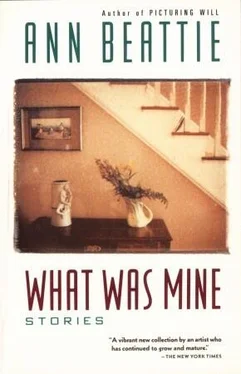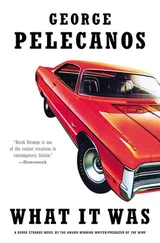Ann Beattie - What Was Mine
Здесь есть возможность читать онлайн «Ann Beattie - What Was Mine» весь текст электронной книги совершенно бесплатно (целиком полную версию без сокращений). В некоторых случаях можно слушать аудио, скачать через торрент в формате fb2 и присутствует краткое содержание. Год выпуска: 1992, Издательство: Vintage, Жанр: Современная проза, на английском языке. Описание произведения, (предисловие) а так же отзывы посетителей доступны на портале библиотеки ЛибКат.
- Название:What Was Mine
- Автор:
- Издательство:Vintage
- Жанр:
- Год:1992
- ISBN:нет данных
- Рейтинг книги:5 / 5. Голосов: 1
-
Избранное:Добавить в избранное
- Отзывы:
-
Ваша оценка:
- 100
- 1
- 2
- 3
- 4
- 5
What Was Mine: краткое содержание, описание и аннотация
Предлагаем к чтению аннотацию, описание, краткое содержание или предисловие (зависит от того, что написал сам автор книги «What Was Mine»). Если вы не нашли необходимую информацию о книге — напишите в комментариях, мы постараемся отыскать её.
What Was Mine — читать онлайн бесплатно полную книгу (весь текст) целиком
Ниже представлен текст книги, разбитый по страницам. Система сохранения места последней прочитанной страницы, позволяет с удобством читать онлайн бесплатно книгу «What Was Mine», без необходимости каждый раз заново искать на чём Вы остановились. Поставьте закладку, и сможете в любой момент перейти на страницу, на которой закончили чтение.
Интервал:
Закладка:
It occurred to her that the Europeans — who seemed capable of making wonderful comedies out of situations that were slightly off kilter — might make an interesting film about her relationship with Andrew: running off to Paris to marry him when she was twenty, and losing her nerve; marrying him two years later, in New York; having an abortion; leaving; reuniting with him a few months later at the same hotel that they had gone to on the first trip to Paris in 1968, and then divorcing the summer after their reunion; keeping in touch for fifteen years; and then beginning to vacation together. He had married during that time, was now divorced, and had twin boys who lived with their mother in Michigan.
She had been sitting at Andrew’s table, quietly, waiting for him to reach a point where he could stop in his writing. She was accustomed to doing this. It no longer irritated her that for seconds or minutes or even for half an hour, she could be no more real to him than a ghost. She was just about to pull her chair into the shade when he looked up.
He told her, with great amusement, that earlier that morning an English couple with their teenage son had sat at the table nearby, and that the Englishwoman, watching him write, had made him a moral example to her son. She thought that he was a man writing a letter home. She had heard him ordering tea, in English, and — he told Christine again, with even more amusement — assumed that he was writing a letter home. “Can you imagine?” Andrew said. “I’d have to have a hell of an original mind to be scribbling away about a bunch of stones and the Mediterranean. Or, to give her credit, maybe she thought I was just overwrought.”
She smiled. For anyone to assume that he liked to communicate about anything that might be even vaguely personal was funny itself, in a mordant way, but the funnier thing was that he was so often thrown by people’s quite justifiable misperceptions, yet rarely cracked a smile if something was ludicrous. She had noticed early on that he would almost jump for joy when Alfred Hitchcock did his usual routine of passing briefly through his own film, but when she insisted that he watch a tape of Martin Short going into a frenzy as Ed Grimley on Saturday Night Live , he frowned like an archaeologist finding something he had no context for and having to decide, rather quickly, whether it was, say, an icon or petrified cow dung.
She had come to realize that what fascinated her about him was his absolute inadequacy when it came to making small talk. He also did not think of one thing as analogous to another. In fact, he thought of most analogies, metaphors, and similes as small talk. Nothing that caught Diane Arbus’s eye ever interested him, but he would open a book of Avedon’s photographs and examine a group shot of corporate executives as if he were examining a cross section of a chambered nautilus. When something truly interested him, he had a way of curling his fingers as if he could receive a concept in the palm of his hand.
The day before, Andrew’s publisher had cabled to see when the book of essays could be expected. For once he was ahead of schedule with his writing, and the cable actually put him in a better mood. There had been some talk, back in the States, of the publisher’s coming from Rome, where he had other business, to Atrani, to spend a few days with them. But just as they were leaving the States, Libya had been bombed, flights were canceled, people abandoned their travel plans. In the cable, the publisher made no mention of coming to Italy. There were few Americans anywhere around them: Libya and Chernobyl had obviously kept away those Americans who might have come before the season began.
Christine looked at the sky, wondering how many hang gliders would be up there during the summer. Icarus came to mind, and Auden’s poem about the fall of Icarus that she had studied, years ago, in Andrew’s poetry class. It was difficult to remember being that person who sat and listened, although she sometimes remembered how happy she had been to feel, for the first time, that she was part of something. Until she went to college and found out that other people were interested in ideas, she had settled for reading hundreds of books and letting her thoughts about what she read pile up silently. In all the years she spent at college in Middletown, she never ceased to be surprised that real voices argued and agreed and debated almost throughout the night. Sometimes, involved as she was, the talk would nonetheless become mere sound — an abstraction, equivalent to her surprise, when she left the city and lived in the suburbs of Connecticut, that the sounds of cicadas would overlap with the cries of cats in the night, and that the wind would meld animal and insect sounds into some weird, theremin-like music. Andrew was probably attracted to her because, while others were very intelligent and very pretty, they showed their excitement, but she had been so stunned by the larger world and the sudden comradeship that she had soaked it in silently. He mistook her stunned silences for composure and the composure for sophistication. And now, in spite of everything they had been through, apparently she was still something of a mystery to him. Or perhaps the mystery was why he had stayed so attached to her.
They had lunch, and she sipped juice through one of the thin red plastic straws, playing a child’s game of sipping until the juice was pulled to the top of the straw, then putting her tongue over the top, gradually releasing the pressure until the sucked-up juice ran back into the glass. She looked over the railing and saw that only a few beachboys were still there, sanding the boats. Another sat at a table on a concrete slab above the beach, eating an ice cream. Although she could not hear it from where she sat, he was probably listening to the jukebox just inside the other café—the only jukebox she knew of that had American music on it.
“You’ve been flirting with them,” Andrew said, biting his roll.
“Don’t be ridiculous,” she said. “They see me every day. We exchange pleasantries.”
“They see me every day and look right through me,” he said.
“I’m friendlier than you are. That doesn’t mean I’m flirting.”
“ They’re flirting,” he said.
“Well, then, it’s harmless.”
“For you, maybe. One of them tried to run me down with his motorcycle.”
She had been drinking her juice. She looked up at him.
“I’m not kidding. I dropped the Herald ,” he said.
The archness with which he spoke made her smile. “You’re sure he did it on purpose?” she said.
“You love to blame me for not understanding simple things,” he said, “and here is a perfect example of understanding a simple thing. I have put two and two together: they flirt with my wife and then, when they see me crossing the street, they gun their motorcycles to double the insult, and then I look not only like an old fool but a coward.”
He had spoken in such a rush that he seemed not to realize that he had called her “my wife.” She waited to see if it would register, but it did not.
“They are very silly boys,” he said, and his obvious petulance made her laugh. How childish — how sweet he was, and how silly, too, to let on that he had been so rattled. He was sitting with his arms crossed, like an Indian chief.
“They all drive like fools,” he said.
“All of them?” she said. (Years ago he had said to her, “You find this true of all Romantic poets?”)
“All of them,” he said. “You’d see what they did if you came into town early in the morning. They hide in alleyways on their motorcycles and they roar out when I cross, and this morning, when I was on the traffic island with the Herald , one of them bent over the handlebars and hunched up his back like a cat and swerved as if he were going to jump the curb.”
Читать дальшеИнтервал:
Закладка:
Похожие книги на «What Was Mine»
Представляем Вашему вниманию похожие книги на «What Was Mine» списком для выбора. Мы отобрали схожую по названию и смыслу литературу в надежде предоставить читателям больше вариантов отыскать новые, интересные, ещё непрочитанные произведения.
Обсуждение, отзывы о книге «What Was Mine» и просто собственные мнения читателей. Оставьте ваши комментарии, напишите, что Вы думаете о произведении, его смысле или главных героях. Укажите что конкретно понравилось, а что нет, и почему Вы так считаете.












